- Government
- Posted
Energy refurb scheme for existing homes launched by Minister Ryan
Construct Ireland can exclusively reveal that Energy Minister Eamon
Ryan has today announced the launch of the pilot Home Energy Saving
Scheme.
The scheme will encourage and incentivise homeowners to improve the energy efficiency of their homes in order to reduce energy use and greenhouse gas emissions.
With an initial investment of €5 million, this regional scheme is designed to inform the roll-out of the full scale €100 million national scheme envisaged in the Programme for Government.
The scheme will target older housing as these homes are most in need of energy efficiency retrofitting. It will begin its work with 2,000 homes in a regional pilot in North Tipperary, Limerick, Clare and Dundalk. There will be an additional strand, which will allow for clusters of housing throughout the country.
Householders will avail of a Building Energy Rating (BER) assessor to come to their house, give the home a BER rating and advise on the works that need to be carried out to improve energy efficiency. The homeowner will pre-pay €100 towards the cost of this assessment, with Sustainable Energy Ireland subsidising the balance. Approximately two thirds of the cost of the assessment will be covered by the Government.
The assessor may advise that the homeowner adopt a range of energy efficiency measures to improve the building’s performance, with typical options including attic insulation, interior or exterior wall insulation, low emissions double-glazing and heating control. The Government will then cover up to 30% of the cost of these works, to a maximum of €2,500. On completion of the works a follow-up energy assessment on the building will be undertaken so that we have a “before and after” test of what has been done.
A spokesperson in Sustainable Energy Ireland told Construct Ireland that the new scheme is not expected to include renewable energy, given that this is already covered under the Greener Homes Scheme.
Green loans
Remarkably, the scheme will also apparently coincide with the introduction of low energy upgrade loans from financial institutions.
The scheme will be administered by Sustainable Energy Ireland and locally by the Tipperary Energy Agency, the Limerick/Clare Energy Agency and the SEI team in Dundalk. One of the aims is to get a grouping of houses to have the same work undertaken so that the cost to each individual householder comes down.
Launching the scheme Minister Ryan said, “Of the 1.7 million homes in Ireland, it is estimated that up to 1 million require some investment to improve their energy efficiency. This scheme will support homeowners who wish to invest in their homes to bring them up to modern energy efficiency standards. Such investment has been shown to pay for itself in energy savings in a few short years.
This scheme will help Ireland meet our climate change targets at the same time as assisting the householder with energy costs. Householders will save on their electricity and heating bills; they will use their energy more wisely and increase the re-sale value on their homes. The scheme will also be welcome news for the house-building sector.”
SEI estimate that the householder will save up to €500 in their energy bills every year and that the scheme will save 6,000 tonnes of carbon in its first year alone.
The full €100 million scheme is expected to yield greenhouse gas savings of 175,000 tonnes per year. The objectives of the Home Energy Saving Scheme are to reduce energy use and carbon dioxide emissions from the existing housing stock, and to support the development of the energy services industry in Ireland.
A budget of €5m has been allocated for the scheme in 2008.
The key features of the pilot scheme are:
A specific objective of the scheme will be to support the development of the energy services industry in Ireland. The scheme will be managed locally in the North Tipperary area by Tipperary Energy Agency and in Limerick / Clare by the Limerick Clare Energy Agency. Local management of the scheme in the Dundalk area will be handled by Sustainable Energy Ireland’s Dundalk 2020 team. The 4th national test project will be managed by an energy services company under a contract for services.
In the event that more applications are received than can be accommodated in the pilot project, Sustainable Energy Ireland will shortlist applicants on the basis of quotas and / or random sampling techniques.
Applicants will be required to have their home assessed by a Building Energy Rating assessor and pre-pay a heavily subsidised BER fee of €100 towards the cost of this assessment. Supports will be conditional on completion of energy efficiency improvement works recommended by the assessor in the advisory report.
Further detail on the new scheme will be revealed in the forthcoming May/June edition of Construct Ireland
With an initial investment of €5 million, this regional scheme is designed to inform the roll-out of the full scale €100 million national scheme envisaged in the Programme for Government.
The scheme will target older housing as these homes are most in need of energy efficiency retrofitting. It will begin its work with 2,000 homes in a regional pilot in North Tipperary, Limerick, Clare and Dundalk. There will be an additional strand, which will allow for clusters of housing throughout the country.
Householders will avail of a Building Energy Rating (BER) assessor to come to their house, give the home a BER rating and advise on the works that need to be carried out to improve energy efficiency. The homeowner will pre-pay €100 towards the cost of this assessment, with Sustainable Energy Ireland subsidising the balance. Approximately two thirds of the cost of the assessment will be covered by the Government.
The assessor may advise that the homeowner adopt a range of energy efficiency measures to improve the building’s performance, with typical options including attic insulation, interior or exterior wall insulation, low emissions double-glazing and heating control. The Government will then cover up to 30% of the cost of these works, to a maximum of €2,500. On completion of the works a follow-up energy assessment on the building will be undertaken so that we have a “before and after” test of what has been done.
A spokesperson in Sustainable Energy Ireland told Construct Ireland that the new scheme is not expected to include renewable energy, given that this is already covered under the Greener Homes Scheme.
Green loans
Remarkably, the scheme will also apparently coincide with the introduction of low energy upgrade loans from financial institutions.
The scheme will be administered by Sustainable Energy Ireland and locally by the Tipperary Energy Agency, the Limerick/Clare Energy Agency and the SEI team in Dundalk. One of the aims is to get a grouping of houses to have the same work undertaken so that the cost to each individual householder comes down.
Launching the scheme Minister Ryan said, “Of the 1.7 million homes in Ireland, it is estimated that up to 1 million require some investment to improve their energy efficiency. This scheme will support homeowners who wish to invest in their homes to bring them up to modern energy efficiency standards. Such investment has been shown to pay for itself in energy savings in a few short years.
This scheme will help Ireland meet our climate change targets at the same time as assisting the householder with energy costs. Householders will save on their electricity and heating bills; they will use their energy more wisely and increase the re-sale value on their homes. The scheme will also be welcome news for the house-building sector.”
SEI estimate that the householder will save up to €500 in their energy bills every year and that the scheme will save 6,000 tonnes of carbon in its first year alone.
The full €100 million scheme is expected to yield greenhouse gas savings of 175,000 tonnes per year. The objectives of the Home Energy Saving Scheme are to reduce energy use and carbon dioxide emissions from the existing housing stock, and to support the development of the energy services industry in Ireland.
A budget of €5m has been allocated for the scheme in 2008.
The key features of the pilot scheme are:
*Supports for the upgrade of energy efficiency measures in existing dwellings, such as wall and roof insulation, low emissivity double glazing and heating controls (theremostatic radiator valves, timers etc);Supports will be available for 3 levels of intervention:
* Support linked to house specific Building Energy Ratings and advisory reports, and to specific gains in BER performance from investment undertaken;
* Delivery of scheme supports via local energy agencies, energy service companies and by Sustainable Energy Ireland;
* Supports varying in different pilot areas to allow testing of impacts;
* Capital grants where available will be to a maximum of 30% of costs or the upper threshold (whichever is the lower).
* Low interest loans (where applicable) will be provided directly by financial institutions.
* Information and advice provision will be in the form of a Building Energy Rating certificate and associated advisory report and follow up advice.
* As a pilot scheme, various aspects will be evaluated to inform the roll-out of a full scale scheme in 2009, including impacts, effectiveness and value for money of the energy efficiency upgrade measures undertaken, the types of supports employed and the delivery mechanisms utilised.
* Warm zone – upgrading one or two rooms in a house to improve efficiency and comfort in low occupancy contexts (upper capital grant threshold €1,500);The scheme will operate on the basis of 4 test projects, 3 of which will take place in limited geographical areas – North Tipperary, Dundalk and Limerick/Clare (excluding Limerick City). The 4th test project will operate nationally, but excluding the other test project areas. Different support measures will be made available in each test project area so that their impact may be assessed.
* Whole house – householder undertakes whole-house action to meet a specific BER performance improvement target (upper capital grant threshold €2,500); and
* Cluster – group of houses engage service providers collectively in order to achieve performance upgrades and higher value through economies of scale (upper capital grant threshold €2,000)
A specific objective of the scheme will be to support the development of the energy services industry in Ireland. The scheme will be managed locally in the North Tipperary area by Tipperary Energy Agency and in Limerick / Clare by the Limerick Clare Energy Agency. Local management of the scheme in the Dundalk area will be handled by Sustainable Energy Ireland’s Dundalk 2020 team. The 4th national test project will be managed by an energy services company under a contract for services.
In the event that more applications are received than can be accommodated in the pilot project, Sustainable Energy Ireland will shortlist applicants on the basis of quotas and / or random sampling techniques.
Applicants will be required to have their home assessed by a Building Energy Rating assessor and pre-pay a heavily subsidised BER fee of €100 towards the cost of this assessment. Supports will be conditional on completion of energy efficiency improvement works recommended by the assessor in the advisory report.
Further detail on the new scheme will be revealed in the forthcoming May/June edition of Construct Ireland
Last modified on Thursday, 24 April 2008 18:19
Related items
-
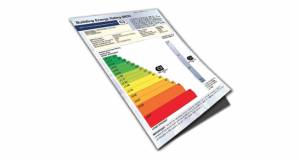 BERCerts.ie offering ventilation validation
BERCerts.ie offering ventilation validation -
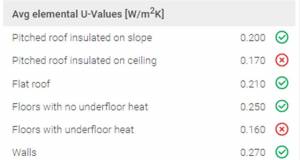 Software errors create false NZEB compliance picture
Software errors create false NZEB compliance picture -
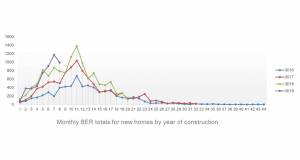 BER data indicates national house building growth – except for Dublin
BER data indicates national house building growth – except for Dublin -
 The Jodrell Bank grand challenge
The Jodrell Bank grand challenge -
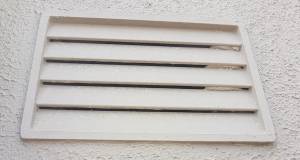 BER data: sick buildings risk while new build surges
BER data: sick buildings risk while new build surges -
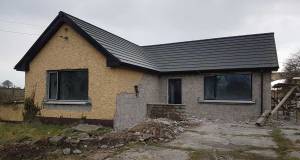 G-rated Meath bungalow aims for A rating — without renewables
G-rated Meath bungalow aims for A rating — without renewables

